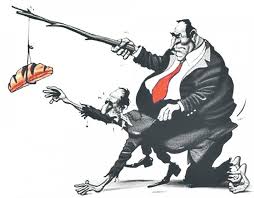Will president M7 win the corruption war? On posters seen circulating on social media, Ugandans are being called upon to March to parliament in protest of the normalization of corruption and kleptocracy at the Ugandan parliament and other institutions of Government. “…we are tired of seeing money meant for schools, hospitals, and roads disappear….” Read some of the posters seen on social Media. Is it the end of the beginning or the beginning of the end of kleptocracy in Uganda?
In a kleptocracy, corrupt politicians enrich themselves secretly outside the rule of law, through kickbacks, bribes, and special favors from lobbyists and corporations, or they simply direct state funds to themselves and their associates.
According to several Auditor General Reports, Uganda loses about 40 percent of its budget financing to corruption. Are citizens working to pay thieves to steal more and more from them?
At this rate, there can’t be any successful government program or project which leads to a non-existing economy and manufactured economic growth rates, as citizens thrive toward absolute poverty, stress, unemployment and high taxes. Is this yet to end?
Earlier this month, in his State of the Nation Address at Kololo Ceremonial Grounds, Museveni said the politicians were part of groups perpetrating graft in the country. This was the first time President Museveni publicly spoke about corruption in parliament following intense media and social media reports.
“I have been hearing, but now I have proof. I have been hearing that from the ministry of Finance, they arrange with accounting officers of ministries to come to parliament. Working with some people there, to provide certain funds provided you take a share. I didn’t believe it but now I have proof,” added Museveni.
Only a few days after his public speech, Lwengo District Woman representative Cissy Namujju, Bunyole East MP Yusuf Mutembuli, and his Busiki South counterpart Paul Akamba were arrested for stealing billions.
Prosecution averred that the trio offered to lobby Parliament’s Budget Committee to increase the annual allocations of the Uganda Human Rights Commission, the statutory rights body, on condition that 20 percent of the increment was passed back to them.
“Mutembuli, Akamba and Dionizia … solicited an undue advantage … by asserting that they were able to exert improper influence over the decision-making of the budget committee of parliament of Uganda to increase the UHRC budget,” the charge sheet notes.
Also, Igara East MP, Michael Mawanda, Elgon County MP, Mudimi Wamakuyu and their Busiki County counterpart, Paul Akamba were later arrested and charged with Leonard Kavundira, the Principal Cooperative Officer in the Ministry of Trade for conspiracy to defraud government more than 7.3 billion shillings for Buyaka Growers Cooperatives Society Limited.
For how long has this theft competition been happening at parliament? An external audit could be necessary into the entire tenure and activities of this 11th Parliament. If the government doesn’t buy the idea, I as one of the concerned citizens would be happy if the international community like the World Bank, USA, UK, the European Union and donor agencies demand for the same, or even issue strict monetary and financial sanctions against the Ugandan parliament or its legislators.
Ramathan Ggoobi, the Finance Ministry Permanent Secretary and secretary to the treasury admitted that MPs have been tampering with the budget for years, moving government priorities and replacing them with other needs in their constituencies.
“Uganda has a lot of budget games…Some (MPs) tell the accounting officers ‘Do you want more money, yes come and talk to us, we shall put in more money but you must return some’,” he said as quoted in the East African Magazine
Parliament as an arm of government is meant to foster accountability of government and its institutions. Accountability is part and parcel of democracy, and without it, there is no democracy, and therefore parliament is supposed to ensure balance within government and its institutions.
It’s quite absurd to learn that an accounting agency which also happens to be an arm of a democratic government is now a den (home) of thieves. What is the speaker’s stance about this institutional decay? And what is the way forward? Could she have been the first beneficiary? Or will she expose or continue to shield and to preside over such a messed-up institution? Many questions to ask in this context! Does the President have to intervene or she has been the shield of game?
Detectives and intelligence agencies should continue targeting accounting officers and managing directors of the affected ministries and bodies. What is Adolf Mwesige still doing at Parliament as a clerk given all the previous allegations we have been seeing at Parliament?
Transparency of public funds should be the first priority of Parliament, but it’s now vice versa. Is the government and the intelligence agencies aware of what is happening in Kenya or am I overrating the Ugandan situation?
In my own view, “If audits are not carried out today, the lifespan of the regime can be told. And when the regime is no more, audits will be necessary” Is it the end of the beginning or the beginning of the end of kleptocracy at Parliament?
Richard Bard Byamukama is a lawyer and a student of security and strategic studies















